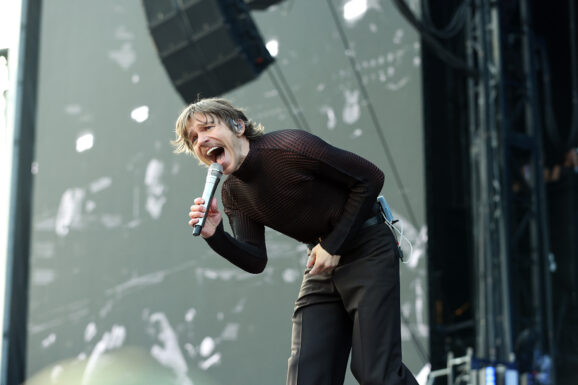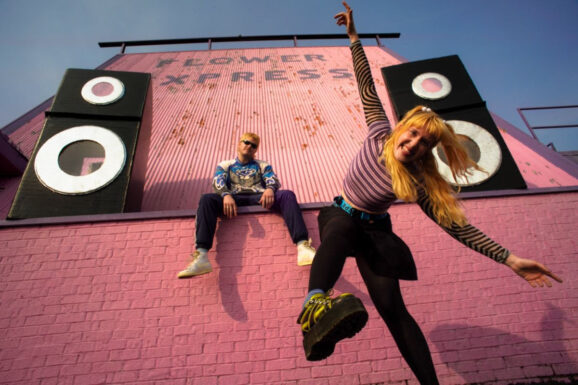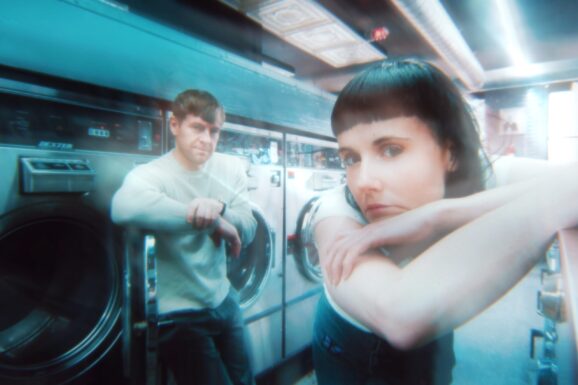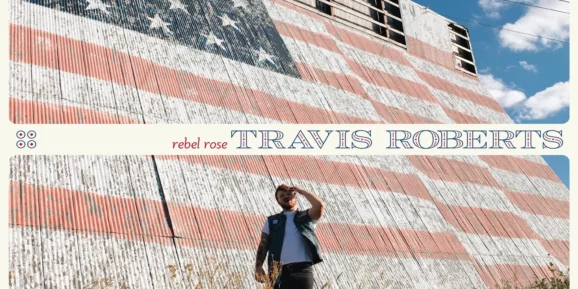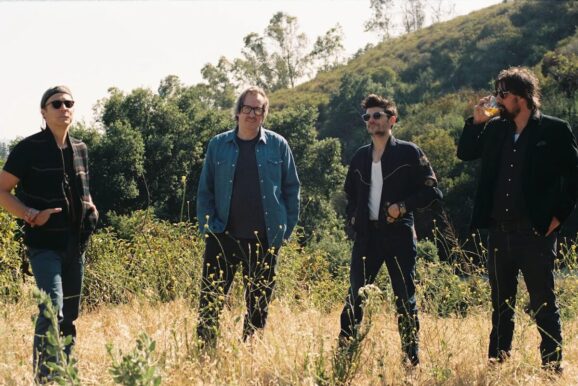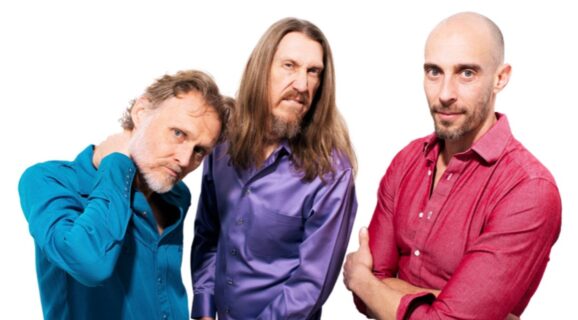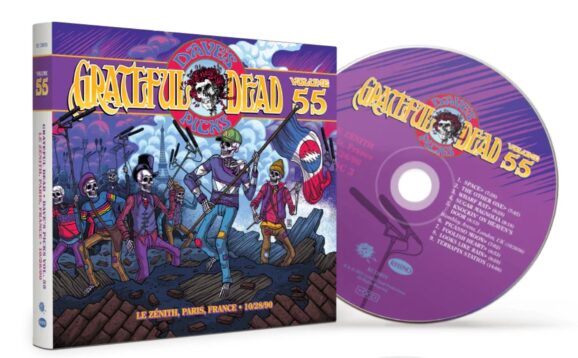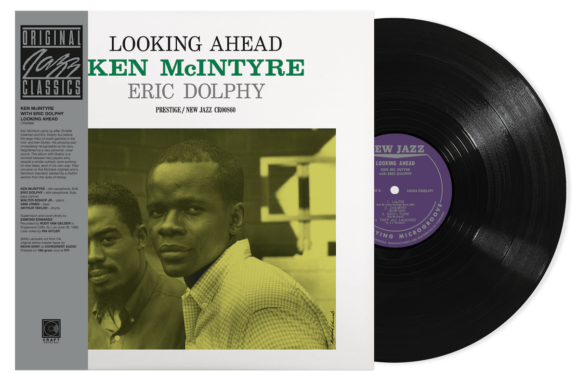Joe Hertler & The Rainbow Seekers recently released their EP, Painted World, via Nettwerk. It’s part of an ongoing series of releases from them that all hail from a highly productive period of songwriting and recording throughout the pandemic. It’s also a reflection of the many years the bandmates have spent working together and their sense of having reached a new level of communication when working together which brought bigger developments to their recording process.
Joe Hertler & The Rainbow Seekers are known for their jam band live performances and gearing a lot of their songwriting towards later expansion for audiences. Having just come off a substantial tour where they introduced the songs from their new EP, Joe Hertler was an excellent space to talk about how those songs reflect their ethos and play out in a live setting. I spoke to him about these new tunes, this substantial burst of songwriting and recording that they experienced, and why the ideas behind happiness and joy are on his mind these days.
When we spoke, Hertler were on the road and spending some unexpected time hanging out in Arizona waiting for a replacement part for their van, but also making the most of it by heading out into the desert to shoot a new music video.
Hannah Means-Shannon: Do the songs we see on Painted World come from a bigger batch of songs that you’ve been working on?
Joe Hertler: Yes, pretty much. Almost all of it was written during Covid, during a time when there was a lot of uncertainty and I didn’t know if my career was going to be over. Thematically, all the songs are tied and there will be a record. For a band like us, we release things as a couple of EPs which will be combined together into a final release next year.
HMS: That’s a model that a lot of artists are following these days. I know that some singles have been coming out from the EP. Have you all been playing those on your current tour?
JH: Yes, we have. We released a song called “HELP” and another called “What I Want”. Over the last year, we’ve been testing stuff out live and we’d play them for a month or two, then put them back in the bank. The response to both of those songs, in particular, has been very strong. It’s cool to add such high energy tracks to what we play live.
HMS: It seems like live play has always been very important to your identity as a band. Do you think about those dynamics when you’re writing songs like these?
JH: For the most part. At the end of the day, I’m mostly a singer-songwriter and Producer. The band takes over when we play stuff live, then we become a full band unit. At that point, everyone can insert themselves into how we perform it live and expand on it. We develop the ideas beyond what’s in the recording. That’s one of the reasons why performing is our bread and butter. We let things happen naturally. In the studio, we try to be a little more refined, and not get too over the top with jams. We try to save those ideas for when we’re starting to play live. It it something we definitely think about from the onset, when the seed of a song first starts to sprout.
HMS: That’s cool that you file ideas away before you perform. How did you get into songwriting when the world was in such a strange place?
JH: About two months in, I had spent some time mourning the situation. Then I just thought, “Well, I better get back to work!” So I just spent all my energy and time focusing on new music. This record came from it. I probably wrote 30 or 40 songs. I felt like I was at my creative peak. Songs kept showing up and you have to be grateful when you get even one song. You discover them as if you were in a mine looking for precious stones. When you find one, you polish it up, and try to turn it into something that means something and has a little bit more weight and value.
HMS: That’s a great image. Were you able to develop the songs at home fully?
JH: Oh, yes. As my journey with music has continued, I’ve begun to identify as a Producer and arranger. I have way too much gear. [Laughs] And it will probably continue to accumulate. I write and Produce with my guitar player and keyboard player, Micah [Bracken] and Ryan [Hoger]. When we got to the point that we had developed the songs, we decided to take them to Nashville and work with one of our buddies. We wanted to get a fresh set of ears on them.
We thought we wouldn’t be there for very long, maybe a few weeks, but we actually made some radical changes to the songs in those sessions and were going back and forth for six to eight months. It worked out really well. We’d go for a week every month or so. It was just fun. We were communicating really well. Me, Mike, and Ryan have been making music for a long time, but we had levelled up in our own music relationship. We’d spent all these years doing this, but you learn more and get a little more sensitive. It kind of felt like all those years were worth it. It was like “Oh this is why we did all those years of grinding.”
HMS: That’s a very helpful story. That might provide some encouragement to people who want to get to that place but are still in the grind period. You have to keep going.
JH: The growth period never ends. You can also work your butt off and still may not get to where you want to go, but for us it was clearly part of the journey. It was something to be appreciated. We did!
HMS: Everything you’re saying seems to tie into these songs, too, which is interesting. What made you choose these songs for Painted World?
JH: It was more of a vibe thing than about strict thematic elements. There’s also just timing things. We felt like these songs tied together. A lot of the songs speak to similar ideas. Quite frankly, we’ll rearrange things again when we release the whole record. But we looked at different combinations of songs and went with what sounded good. Micah is the setlist master and he’s always determined song order. He does it very well.
HMS: My compliments to Micah on that. I think the order of these songs makes sense on this EP. It seems to have a little arc to it. To me, “What I Want” is the obvious way to start off, and it should absolutely be the first song. It gets people thinking and brings out some emotions. Then, “HELP” is even about a journey, a somewhat internal one, and is very honest about getting up and starting over.
JH: Definitely. That one was completely tied into the feeling, “Oh shit, am I going to have to start again?”
HMS: You mentioned earlier that people don’t always get what they want, and that takes us into the song, “What I Want.” I guess the danger of being goal-oriented is wondering if you’re seeking the right goal?
JH: Goals are great. I used to have a ton of goals, and I journal a lot. At some point, it was cool to check off those goals. But at some point, you have to appreciate the process and appreciate the craft. Any victory that you have, at least to me, should not be something you check off. When we played a big show, I found there was a switch between celebrating the show itself and wanting to celebrate the work that it took to get to that show.
You put in a lot of effort and go through a lot of ups and downs to reach something, and to me, that should be celebrated. That’s what gives a goal meaning. It gets really easy to start working towards a goal, get frustrated, and veer off, but if you put in the work, day by day, you reach it. Also, you should realize that once you reach that goal, you’re just going to want something else! I just posted a video on my Youtube channel talking about the distinctions between joy and happiness.
To me, happiness is wanting something and getting it, so you’re happy. Like, you just played Red Rocks, so you’re happy. But then there’s joy, and joy is a second mountain that you climb where the real meaning of life is explored. When I look back on the band, it’s going to be the relationships that I had with my bandmates, and that shared experience, that brings me joy. Obviously, joy can be found in lots of other things, too. It could be having a child or getting to spend time with your family. Those important things can be increasingly lost in our society. I’m into productivity, don’t get me wrong, but I think it’s important to remember that life is short. You don’t want to spend too much time looking off into the distance and wanting things.
HMS: The work ethic in America can be very driving and other countries criticize that about us, rightly. They think it’s weird. There’s a point where we might actually sell ourselves short, too, because we don’t take the time to pat ourselves on the back and appreciate what we’ve done. We’re just on to the next thing. We don’t look at how we got there.
JH: I’m with you. You can also use whatever successes you have as a springboard into joy rather than just into immediate happiness. Happiness is not a bad thing, either, it should be appreciated. You should treat yourself and feel okay about it.
HMS: I did see the advice video that you put up. I thought it was interesting and earnest to talk to friends and fans so directly. It’s pretty much in keeping with the ethos of your music, too.
JH: Everyone who’s watched it has liked it and I want to do some more long-form content like that. I like to write essays to myself and I’d like to get them out there. It’s a way to connect with people, and that’s my driving factor in music. Not everything has to rhyme or have a melody. There are other aspects, artistically, to explore.
HMS: Your video for “What I Want” is also really fun and suggests lots of potential ideas to link to the song. It’s wacky and quite scripted. How did you decide on the ideas for that one?
JH: My buddy Kevin owns a company called Rhino media, a really cool little film studio in Kalamazoo. It’s a lot of really talented people who were out in LA but wanted to come back to Michigan. This is the third music video he’s done for us. We give him the song and the concepts, then take a step back. I can’t take credit for anything in that video except the song. It turned out cool! There were a few things we wanted to shoot that we didn’t get to shoot, but it was super fun to make. Overall, it was the most challenging video we’ve tried to make.
HMS: It’s got some complexity to it. It’s cool how it keeps flowing from one thing to the next and it made me think of the way that, when you’re trying to get something, it always eludes you.
JH: Exactly, that’s what he was going for. There’s a three second pool shot, and that shoot itself was about eight hours. It was in Michigan and it was cold. The pool was heated, but it was only heated to about 66 degrees. It did not feel warm at all. I jumped into that pool probably 40 or 50 times, but we got it done! [Laughs]
HMS: Man, you are dedicated.
JH: I kind of like shared suffering! [Laughs] The crew was getting into the pool, but once you got in, you couldn’t get out because it was 45 degrees outside, so as the shoot went on, there were more and more people in the pool. There were only a couple of people outside the pool running for equipment.
HMS: The video for “HELP” must have been a lot easier. I’m talking about the “Dancing Ghost” version. Was that all made from found footage?
JH: Yes, it was all found. The title of that animation is “Coco the Clown” and I think it came out in the 1920s. That cartoon was made to show off new technology at the time. It was projecting frames of a film onto paper for an artist to draw, which was revolutionary in animation. I really wanted to do an entire video of Princess Mononoke footage, but I couldn’t, so I went for Coco the Clown. I learned how to use Adobe Premier, and I edited the whole thing in the van on my Mac Book. I was totally obsessed with it at the time. We’re actually about to go start shooting a music video for the band today, in the desert, and I have no idea what we’re doing, but we’re going to try!
HMS: That’s the right attitude! But please take some water with you. I want to add that I did like the dancing ghost video because creepy old animation always gets to me. It has a dark fantasy look, which really goes with the idea of the song, which is finding yourself somewhere where everything feels upside down.
JH: I had some reservations about it, but the whole idea of the song is essentially saying, “Death is not bad. Death is good. There’d be no life without death.” The basic idea is that Death is hitch hiking and someone picks him up. He’s frustrated because everyone thinks he’s just this evil entity. God doesn’t respond to any of his e-mails. He’s also the most ancient thing in the universe and kind of lonely. His job is to pick up souls. A driver spends some time with him and this shows that death is powerful and necessary.
HMS: I like how that’s such a full story. Storytelling is less common outside of Roots music, but this is a dance song.
JH: I love fiction and stories. I think that’s where ideas spring up for me, pulled from literature. I try to package it somehow into a song.

